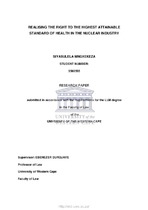| dc.description.abstract | African states are interested in the development of nuclear power (also referred to as atomic power) for the generation of electricity and desalination. These include Algeria, Egypt, Ghana, Kenya, Morocco, Namibia, Niger, Nigeria, Tunisia, South Africa, and Uganda. The nuclear governance in South Africa has adopted principles into its legal system which require it to comply with the objectives of numerous resolutions, conventions, treaties, bilateral and multilateral agreements. Therefore, there is an obligation upon the government through ‘reasonable legislative and other measures’ to manage nuclear matters, such as nuclear accidents, in a manner that protects the general public, atomic industry workers as well as prevents the pollution of the surrounding environment.
It has been seven years since the Fukushima Daiichi Nuclear Power Plant Accident that occurred in Japan on 11 March 2011, when considerable amounts of radioactive material from the damaged plant released into the environment. Health hazards, associated with exposure to low levels of ionising radiation, are a significant concern following such an accident. A nuclear disaster can potentially violate not only the right to health of workers, but that of residents and evacuees alike, particularly pregnant women, older persons, and children. Regional and international human rights conventions impose obligations on state parties to “take whatever steps necessary to ensure that the right to the highest attainable standard of health is enjoyed by all as soon as possible”. In most cases, when a nuclear accident occurs, workers within the nuclear plant are expected to mitigate emergencies. The danger of this expectation is that it could violate their fundamental human rights. | en_US |

